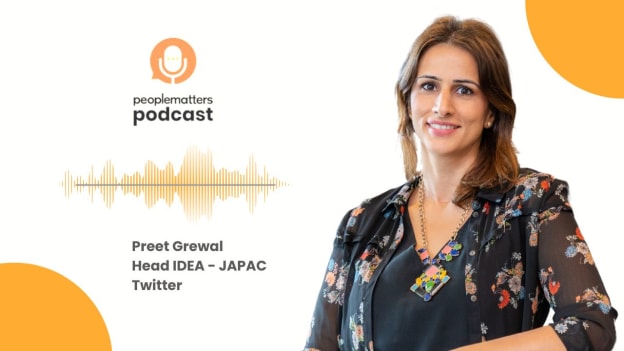Podcast: Twitter’s take on inclusive hiring, allyship and eliminating racial inequities

“We are living through times of undoubtedly high anxiety for employees, more than ever companies need to step in and create an environment where everyone can truly thrive,” says Preet Grewal, Head Inclusion, Diversity, Equity and Accessibility (IDEA), JAPAC, Twitter, in this exclusive Podcast with People Matters.
Preet Grewal is an experienced Inclusion & Diversity leader and has worked in HR for over 18 years. Driven by her passion, she takes pride in her work to create inclusive work cultures where everyone can belong and thrive in the workplace.
As the I&D head for JAPAC at Twitter, Preet leads internal L&D programs, training & engagement to advance global goals and regional growth of Twitter’s business resource groups. Preet is a trusted advisor to her stakeholders and leads with principles of respect and empathy to influence corporate culture change.
Preet has lived in India, UK & Canada and in 2016 she moved with her family to Singapore.
Talking to People Matters about Twitter’s DEI priorities in 2022, Preet highlighted three focus areas:
- Embedding inclusion and diversity principles into Twitter's entire EX journey
- Building inclusive infrastructure for everyone whether through formal trainings, or through informal conversations, and providing a safe space for everyone to learn together
- Representation goals across the board but specifically women in tech
Zooming in on the role of allyship in the entire IDEA journey, Preet noted that becoming an ally involves a little bit of learning and unlearning of our own biases. She bifurcated the allyship framework into two basics:
- Showing up
- Speaking up
“For any company to really have an impact on the outcomes they need to ensure that they are tackling systemic challenges and also impacting the behaviour of their employees and creating an environment where inclusive behaviours are being played out,” Preet said.
A strong advocate for leadership involvement and engagement in organisation wide efforts, Preet shared how leader-driven Business Resource Group (BRG) sessions at Twitter have contributed to building psychological safety and a sense of authentic community at Twitter.
Through BRG, leaders at Twitter advocate and champion for I&D. By providing a space for the workforce to interact with leaders, it also helps the organisation identify whose voice is missing. Further, by consciously creating space for advocacy and education, the social media platform empowers talent from marginalised communities to be more visible and vocal, as well as equips them to move into more senior leadership roles.
Preet further spoke about how Twitter’s dedicated wellness team partners with the IDEA team to stitch crucial conversations. “If something is happening in the external environment which is very triggering to one of our employee populations, then we want to partner with our wellness teams to figure out what can we do, what does allyship look like in the moment, are there specific benefits we need to roll out, should we conduct a session with a mental health professional and more.”
Addressing the debate questioning the meritocracy in diversity hiring, Preet emphasised hiring the most qualified candidates from a diverse talent pool. “You have to ensure that you are actually selecting the most qualified candidate from a diverse talent pool. You have to ensure that the entire process is fair and has equity built in every step.”
The number game in representation, while crucial, carries the potential threat of becoming tokenistic in nature. Advising organisations on how to steer away from the tokenism trap, Preet suggested leading hiring with empathy and inclusion.
“Having a (number) target in mind is important but never enough. Building the structure and framework around it is necessary. When you are building for diversity it is also important that you are building a healthy team that feels psychologically safe, especially for people from marginalised communities.”
Drawing the focus on inclusion hygiene, beyond representation, Preet said, “Inclusion is built through big programmes, but most often both inclusion and exclusion are felt in those moments of daily interactions between people.”
She laid down three essentials for changemakers to drive authentic, sustainable and scalable DEI:
- Accountability. DEI has to be led from the leadership
- Embed I&D into core business and people functions
- Don't stop, it's a journey
“DEI is a journey. Talk about the vision, keep the conversation going on what is it that we are building for and then create that space for individuals, teams and the organisation to come together on that journey.”
"It is about being clear on what is it that we are hoping to drive, and being particular about going after our goals and learning from everything on the way,” she added.
You can listen to the conversation on Spotify / Apple.
You can also access the conversation here:














